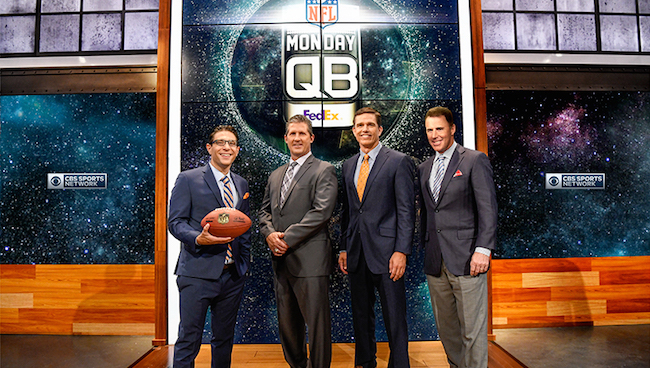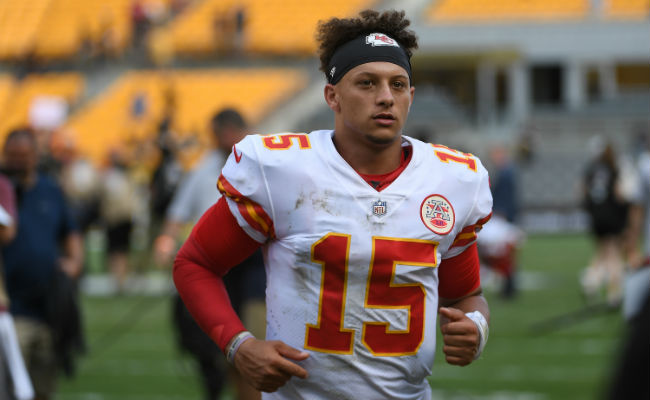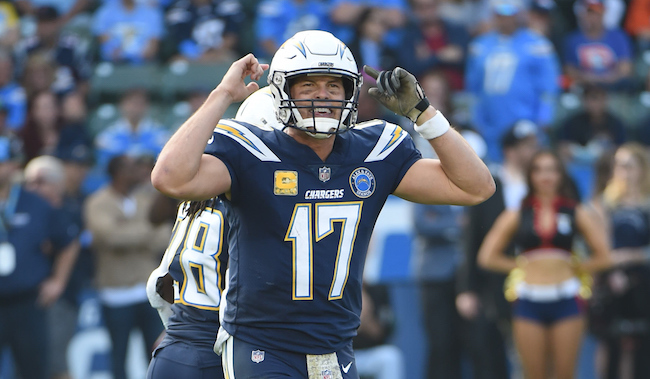
There’s no position in American sports that’s as talked about, debated, or scrutinized as quarterback in the NFL, given that it’s the most visible position in the most popular sport. This has long been true, but given the pass-happy nature of the league in 2018, the quarterback position has never been more important to a team’s success.
Great quarterback play is at a premium, and there are a finite number of quarterbacks capable of being a true “franchise” player, which is why quarterbacks set records for the biggest contracts in league history seemingly every offseason and teams without quarterbacks go for broke in hopes of landing that guy.
For media networks with NFL shows, talking about quarterback play is a top priority, and in 2012, CBS Sports Network was looking to create a unique NFL studio show that would utilize its resources of analysts, most of whom were former quarterbacks. The result was NFL Monday QB, an hour-long show hosted by Adam Schein, a veteran TV and radio host from New York, that airs at 6:00 p.m. ET on CBS Sports Network each Monday during the season.
Since its inception, the show has featured three of CBS’ top game analysts — currently Steve Beuerlein, Rich Gannon, and Trent Green — along with guests from the network like Boomer Esiason and Phil Simms (the latter previously was a regular). The goal was to create the first NFL studio show that exclusively featured quarterbacks, who could lean on their experiences in the NFL and their work as game analysts on the road each week to provide unique insight into the most talked about position in sports.
The biggest reason NFL Monday QB works is its group of analysts, all of whom are former quarterbacks who found themselves in just about every position imaginable on a football team. Those experiences are part of their bond on the show, as the strength of their analysis is rooted in knowing everything that can happen under center.
“They didn’t have a silver spoon when they came into the NFL, I think that adds to it,” Schein told Uproxx Sports. “They’ve been starters. They’ve been backups. They’ve been Pro Bowlers. They’ve dealt with injuries. They’ve dealt with adversity. They’ve been in championship games. So, I think there’s that wide scope where they can talk about basically anything that happens on a Sunday, based on their own experience, which I think is pretty special and pretty rare.”
On top of their experiences, they’re all on the road in a different city doing games, meaning they’re able to share details they’ve picked up in meetings with players and coaches that maybe didn’t make the broadcast when discussing whatever the leading stories are in the league.
“I think we’ve all got relationships with coaches, and our former teammates who are coaching now, players, GMs, and of course we have the unique opportunity to be out on the road every week, at these facilities, at practice, talking to the coaches, the coordinators, and players” Gannon said. “We get a chance, like last week, I had Denver and Kansas City, we were at practice on Friday. We watched [Chiefs QB Patrick] Mahomes work, we spent 30 minutes with them in a production meeting. I think it gives us a little bit of a different perspective than just a talking head that gets on there after the game, and just starts throwing out stats and things like that.”

Mahomes has turned into a star during his first year as a starter, and his play is, unsurprisingly, a regular topic of discussion on the show. Part of that is because of Schein, who producer Andrew Finger referred to as the “president of the Mahomes fan club,” but each of the analysts have thoughts on why Mahomes has been so successful beyond just his spectacular physical talents.
“The thing that jumps up to me, everybody talks about his athleticism, and his arm strength, and extending plays and those kinds of things, that’s all stuff that everybody can see,” Green said. “I think the thing that’s really been impressive to me is the volume of what he is being asked to do and what [Chiefs coach] Andy [Reid] is allowing him to do. Not only cause it’s just his second year in the league, but the fact that he just turned 23 years old. The fact that he’s able to decipher all that stuff. Read coverages, get recognition, know where to go, know what checks to make.”
Beuerlein went onto compare Mahomes favorably to former Broncos star John Elway, and pointed out some decisions Reid and co. made during his first year in the league put Mahomes in a position to succeed.
“I just think that the year with Alex Smith really gave him a blueprint for how to prepare, right?” Beuerlein said. “I also think that what happened last year was, Andy Reid hired [current quarterbacks coach] Mike Kafka. He played at Northwestern and was in the league for a couple years. He was actually with Andy in Philadelphia. So Andy hired him last year, 2017, to be the quality control coach. What he said to him was, ‘I’m gonna have you, you’re gonna be Mahomes’ personal coach. Mahomes is going to go to meetings with Matt Nagy, and with Alex Smith and with me, but at the end of the day, you’re gonna take him in the room, and you’re gonna explain to him the game plan. You’re going to explain to him the potentials. You’re just gonna be his personal coach.’
“That allowed both of them to kind of grow and work together, and for Mike to work on his craft as a coach, and for Patrick to be able to ask questions in an environment where it’s not taking away from Alex Smith’s preparation, and those type of things, kind of a slower pace and now Kafka’s the quarterback coach, so I think he’s really benefited from that whole situation,” Beuerlein continued.
Getting to do NFL Monday QB offers an opportunity for the analysts to expand on things they’re passionate about (like Mahomes) in a way they sometimes can’t on game broadcasts, discuss topics from the other games around the league, and dive deeper into the X’s and O’s than they’re able to in the brief time between plays during games. Sometimes that involves handing out grades for a few quarterbacks that week — Gannon is the consensus “harshest grader” among the bunch — or firing off a hot take on someone’s play, like Gannon ripping into Matthew Stafford on a recent episode.
While delivering opinions and debating hot-button issues around the league are certainly a big part of the show, they also hope to educate fans on the intricacies of quarterback play. It’s one thing to deliver a take about someone’s play, but being able to show the “why” or “why not” is critical to the success of the show. In an era where more information is available to fans, from advanced metrics to All-22 footage of games, the NFL Monday QB crew likes to dive into what people still might miss.
“It’s one of the most frustrating aspects of trying to educate someone whose never played the position, as to what your pre-snap keys are, when a play is called,” Beuerlein explained. “Everything is predicated based on coverage, and based on match ups. Some routes are designed to take advantage of us, and to look at certain defensive coverage. If you don’t get the right look because the defense can chose any one of 20 to 30 different coverages any time they come out, if they don’t give you one of the coverages that the play is designed to take advantage of, then you as a quarterback have to understand, ‘Okay. This is the time where I need to go to my other options. This is not the time to force the ball into a coverage that this play is not designed to go into.’
“They may bust that coverage that they’re playing,” Beuerlein continued. “The guy may end up looking like he’s wide open, but from a quarterback’s perspective, it’s not the coverage that that guy’s supposed to be there. You don’t have three or four or five seconds to drop back and say, ‘Well, I wonder if he’s going to be open anyway.’ You got to get through your read. You got through your progression. A lot of times, these decisions are made because you’re eliminating people before the snap based on what you see in coverage.”

The teaching aspect of the show is the part that excited Green the most. He cited a specific example of what Beuerlein was talking about from a game he did in London between the Jaguars and Chargers, where receiver Keenan Allen was upset with Philip Rivers for not throwing his way when he found himself wide open in the end zone. The pre-snap read, however, took Rivers away from Allen because the look from the defense was in a bracket coverage on his side, with one-on-one matchups on the opposite side where the Chargers were in a trips formation.
“They had a double team inside-out brackets on Keenan, and then single coverage all the way across the board,” Green said. “Well, if you’re the quarterback, and I tried telling that to the people that were listening, I said, ‘If I’m the quarterback, I look I’ve got two guys over here, and I’ve got three guys over here one-on-one. I’m going to all those one-on-one match-ups to see which guy wins.’ Now, the guy that had outside contain on Keenan ended up losing outside contain, and Keenan got across his face, which should never happen. As a quarterback you’ve literally got fractions of a second to make that up. So I was trying to convey that in the seven seconds I had to explain it that, that’s what you wanted. But I would have loved if I wasn’t flying back to 10 hours from London that would have been one I would have wanted to draw up and break it down even more.”
That type of analysis isn’t necessarily unique to NFL Monday QB, but their commitment to trying to highlight those aspects of the game and deliver that perspective is definitely part of what makes the show successful and a worthwhile watch for football fans.
They also know the importance of entertaining the viewers over the course of their 44 minutes on air each week, which is where Schein, well, shines. In something of a twist of irony, it’s the one man on the show without playing experience at the position that serves as the show’s quarterback, getting them from topic to topic and setting up the analysts. Finger called him “the best traffic cop I’ve ever seen,” noting the way he’s able to get everyone on the show involved and not only lob questions at the analysts, but set them up with an opinion of his own that they can offer a reason why they agree or disagree.
Everyone involved with the show were quick to highlight the way Schein’s energy is, as Beuerlein put it, “contagious” and how his passion for the topics makes doing the show even more fun. Schein, however, insists the pleasure is all his, as he gets the chance to talk ball with the guys that have lived it and learn about the game in the process.
“This show makes everybody who’s part of it smarter,” Schein said. “Rich Gannon always likes to talk about the ‘fifth quarter’ of being a quarterback, and leadership and press conferences and dedication and work ethic and never pointing the finger. I learn so much about the game and what a quarterback sees and what goes through the mind of a quarterback. Every single show, sometimes I’m the boy who cried show — ‘that was the best show…that was the best show’ — but that’s the feeling after every NFL Monday QB. My eyes just light up, like, ‘Wow, I didn’t think about that with Baker Mayfield,’ or, ‘I didn’t think about this with Cam Newton.’ It’s remarkable.”
Schein’s excitement is evident on the show, as he brings that boost of energy to ensure it remains upbeat, even when they decide to go deeper into the X’s and O’s. The balance of entertainment and educational value to fans is at the heart of what everyone on the show is hoping to deliver.
Football is supposed to be fun, but it’s also been the focal point of all of their lives for decades. They want to help give that experience to their viewers, helping them become smarter fans in the process.






